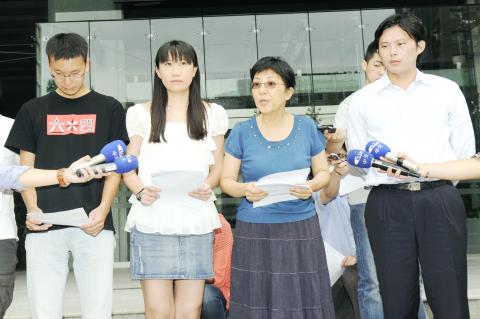|
CtiTV News
‘maliciously twisted’ statements: activists
By Shelley Shan / Staff reporter

Association of Taiwan Journalists
chairperson Chen Hsiao-yi, second left, and three social activists yesterday
stage a protest at the National Communications Commission against a report about
Chen on CtiTV.
Photo: Chen Chih-chu, Taipei Times
Activists opposing media monopolization
yesterday urged the National Communications Commission (NCC) to punish Want Want
China Times Group’s CtiTV News for what they described as “twisting their
statements” on the proposed media anti-monopolization act.
In their petition to the commission, members of 901 Media Anti-Monopoly Alliance
and their supporters said the statements they made on the media
anti-monopolization act at a press conference on Monday were “maliciously
twisted” and turned into a false news report, adding that CtiTV reporters were
at the press conference and knew that the alliance opposed the acquisition of
media outlets by financial groups.
To prove their point, activists provided transcripts of CtiTV’s news story on
the press conference, as well as statements made at the press conference by
former Financial Supervisory Commission chairperson Shih Chun-chi (施俊吉), who
helped draft the version of the media anti-monopolization act proposed by the
activists.
The CtiTV report accused Association of Taiwan Journalists (ATJ) chairwoman Chen
Hsiao-yi (陳曉宜), a representative of the alliance, of employing double standards
on scrutinizing the Want Want China Times Group and the Liberty Times Group, for
which Chen worked as a journalist.
The report said Chen failed to apply the regulation restricting financial
institutions’ investment in media outlets retroactively to the Liberty Times
Group, which CtiTV said showed that Chen was a “hired thug” of group founder Lin
Rung San (林榮三).
In response, Chen demanded that CtiTV make corrections and offer a public
apology at the same news hour in the same proportion as the news story, adding
that she would take legal action if the TV station refused to do so.
“I have stated many times that the alliance favors prohibiting financial
institutions from acquiring media outlets. The regulation should apply to
whomever violates the principle. CtiTV knew this all along, but it continued to
accuse me of saying the exact opposite,” Chen said. “Not only does the
television station abuse the use of a media outlet, but it has also hurt my
interests and damaged the reputation of the ATJ. It should be held responsible.”
Asked by CtiTV reporters if the articles barring financial institutions from
acquiring media outlets in the media anti-monopolization act should be
retroactively applied to the Fubon Group and the Union Group if the act is
passed by the legislature, Chen said the station had apparently confused two
separate matters.
“The retroactive clause would only apply to past media acquisition cases that
cross the ‘red lines’ stated in the proposed media anti-monopolization act...
However, regulations banning financial groups from acquiring media outlets apply
to all media outlets. These two matters are not related,” Chen said.
“I suggest you [CtiTV] take a look at the proposed act and have legal experts
explain it line by line to Tsai if he does not understand it,” Chen said,
referring to Want Want China Times Group chairman Tsai Eng-meng (蔡衍明).
Academia Sinica assistant research fellow Huang Kuo-chang (黃國昌), who was falsely
accused by CtiTV of paying students to rally against Want Want China Times, said
that the incident showed that the TV station has absolutely no remorse over what
it is doing.
“CtiTV became what it is today because it is managed by Tsai, who is not
qualified to manage the media outlets in the first place,” Huang said. “Tsai, if
you really love Taiwan, give journalists and civil society in Taiwan a break.
Stop trashing media outlets and democracy in Taiwan with your money.”
National Taiwan University journalism professor Flora Chang (張錦華) said the
commission had asked CtiTV to address the problems with the operation of its
ethics committee within a designated period at the commission’s biennial
evaluation of the channel’s performance in April.
Chang said that the channel may have violated Article 6 of the Satellite
Broadcasting Act (衛星廣播電視法) because of the incident, which means the commission
is entitled to revoke its broadcasting license.
|
![]()
![]()
![]()